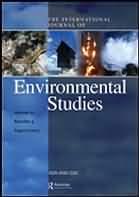|
Literature / Source Database:
International Journal of Environmental Studies
| Title (short) |
Int. J. Environ. Stud. |
| Languages |
English |
| First year |
1970 |
| Editor |
Dr M. R. Brett-Crowther - France |
|
|

|
Status
active
Subject

Source type
Journal
Publisher
ISBN ISSN
0020-7233
E ISSN
1029-0400
First volume
1
Last volume
65+
Homepage
| Resources |
|
Availability |
|
|
|
|
|
| Text PDF |
 |
free access |
 |
| Text Html |
 |
for subscriber |
 |
| References |
 |
not available |
 |
| Abstracts |
 |
|
|
| TOC |
 |
|
|
|
|
|
|

Description
For more than 30 years, the journal has been pre-eminent in its field. The environment is understood to comprise the natural and the man-made, and their interactions; including such matters as pollution, health effects, analytical methods, political approaches, social impacts etc. Papers favouring an interdisciplinary approach are preferred, because the evidence of 30 years appears to be that many intellectual tools and many causes and effects are at issue in any environmental problem - and its solution. This does not mean that a single focus or a narrow view is unwelcome; provided always that the evidence is indicated and the method is robust. Pragmatic decision-making and applicable policies are subjects of interest, together with the problems in establishing facts about dynamic systems where long periods of observation and precise measurement may be difficult to secure.
In other words, a systems or holistic approach to the environment and a scientific analysis are complementary, and the distinction between 'hard' and 'soft' science is bridged in most of the papers published.
These may be on any item in the agenda of environmental science: land, water, food, conservation, population, risk analysis, energy, economics of ecological and non-ecological approaches, social advocacy of arguments for change, legal measures, implications of urbanism, energy choices, waste disposal, recycling, transport systems and other issues of mass society. There is concern also for marginal areas, under-developed societies, minorities, species loss; and indeed no element of the subject of environmental studies, seen in an international and interactive mode, is excluded.
|